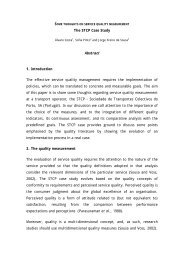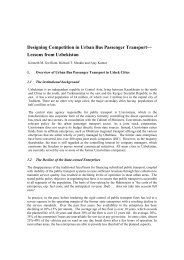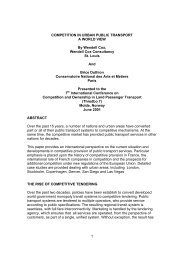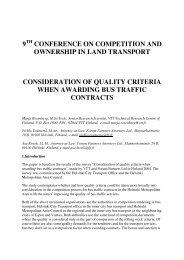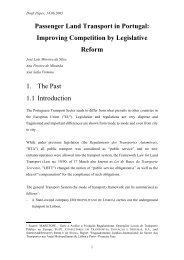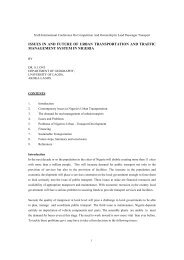the need for regulatory and ownership change in the road ...
the need for regulatory and ownership change in the road ...
the need for regulatory and ownership change in the road ...
Create successful ePaper yourself
Turn your PDF publications into a flip-book with our unique Google optimized e-Paper software.
hour, this does not produce a fifteen m<strong>in</strong>ute frequency but a thirty m<strong>in</strong>ute frequency<br />
with each operator jostl<strong>in</strong>g <strong>for</strong> patronage.<br />
3.3 Observations<br />
The Barbados Transport Board is, <strong>and</strong> s<strong>in</strong>ce its <strong>in</strong>ception always has been, grossly<br />
<strong>in</strong>efficient. It employs far too many staff, pays well <strong>in</strong> excess of market rates to<br />
manual employees, but below market rates to managers. It has a poor st<strong>and</strong>ard of<br />
vehicle ma<strong>in</strong>tenance <strong>and</strong> is never able to provide a full operational service.<br />
Decisions are made on a political basis, ra<strong>the</strong>r than from a commercial or managerial<br />
perspective. Many managers lack suitable qualifications or experience.<br />
The average lifespan of buses is less than one quarter of what it would be if <strong>the</strong>y were<br />
ma<strong>in</strong>ta<strong>in</strong>ed properly. The eng<strong>in</strong>eer<strong>in</strong>g section is grossly over-staffed, <strong>and</strong> skill levels<br />
are low here as well. At <strong>the</strong> start of <strong>the</strong> co-author’s attachment to <strong>the</strong> company, it<br />
was observed that <strong>the</strong>re were more buses out of service than <strong>in</strong> service. Over one<br />
hundred buses had been consigned to a status known as “await<strong>in</strong>g parts”. In reality,<br />
<strong>the</strong>se were unfit ever to return to service aga<strong>in</strong>, <strong>in</strong>deed some of <strong>the</strong>se buses were <strong>in</strong><br />
various states of decomposition <strong>and</strong> had suffered considerable cannibalisation.<br />
Traffic management was non-existent <strong>and</strong> <strong>the</strong> relationship between <strong>the</strong> employees <strong>and</strong><br />
<strong>the</strong>ir managers could best be described as be<strong>in</strong>g <strong>in</strong> a state of anarchy.<br />
The World Bank (1984) <strong>and</strong> Headway Associates (1984) had, some years earlier,<br />
separately produced reports outl<strong>in</strong><strong>in</strong>g managerial deficiencies. In subsequent years,<br />
reports have been produced by Buchanan (1994), Shorey (1996), <strong>and</strong> <strong>the</strong> co-author<br />
(Greenwood 1998) all of whom have reported similarly on <strong>the</strong> ma<strong>in</strong> deficiencies.<br />
There seems to be a tendency at governmental level to commission an <strong>in</strong>vestigation as<br />
a delay<strong>in</strong>g tactic, but <strong>the</strong>n show reluctance to accept <strong>the</strong> advice that has been offered.<br />
At various times over <strong>the</strong> last decade, <strong>the</strong> government has stated that <strong>the</strong> deficit<br />
fund<strong>in</strong>g was to stop <strong>and</strong> that <strong>the</strong> company would have to be managed efficiently, <strong>in</strong><br />
<strong>the</strong> absence of which it would be privatised. However, on none of <strong>the</strong>se occasions<br />
has <strong>the</strong> government been prepared to take <strong>the</strong> difficult decisions emanat<strong>in</strong>g from such<br />
a policy <strong>and</strong> so has allowed th<strong>in</strong>gs to carry on as <strong>the</strong>y always have.<br />
3.4 Outcomes<br />
There is a range of outcomes which have resulted:<br />
1 Unemployment is lower than it would be if <strong>the</strong> government-owned corporation<br />
operated efficiently (although of course it could be ma<strong>in</strong>ta<strong>in</strong>ed that an efficient<br />
country would attract more <strong>for</strong>eign <strong>in</strong>vestment <strong>and</strong> so reduce unemployment).<br />
The government has a certa<strong>in</strong> amount of pride that its state-owned company<br />
looks after its population by provid<strong>in</strong>g employment <strong>in</strong> this way, <strong>and</strong> is critical<br />
of countries elsewhere (eg USA) which it claims do not.<br />
2 Bus passengers receive a poor level of service.<br />
3 Taxpayers contribute more to keep<strong>in</strong>g <strong>the</strong> company afloat than would be <strong>the</strong><br />
case if it were operated more efficiently.



